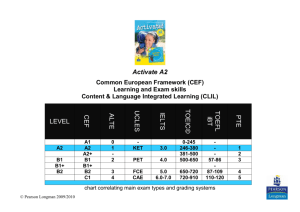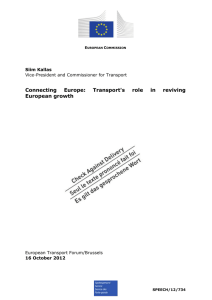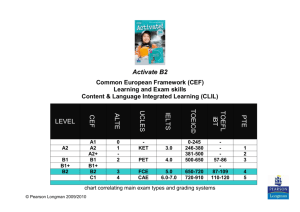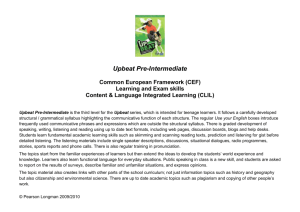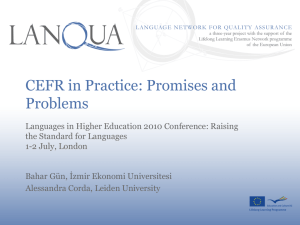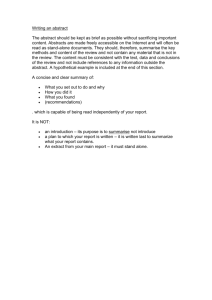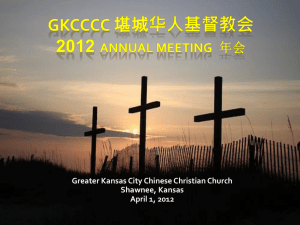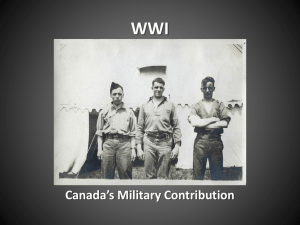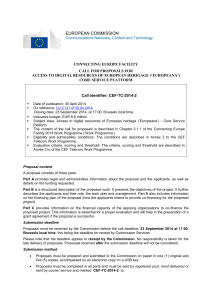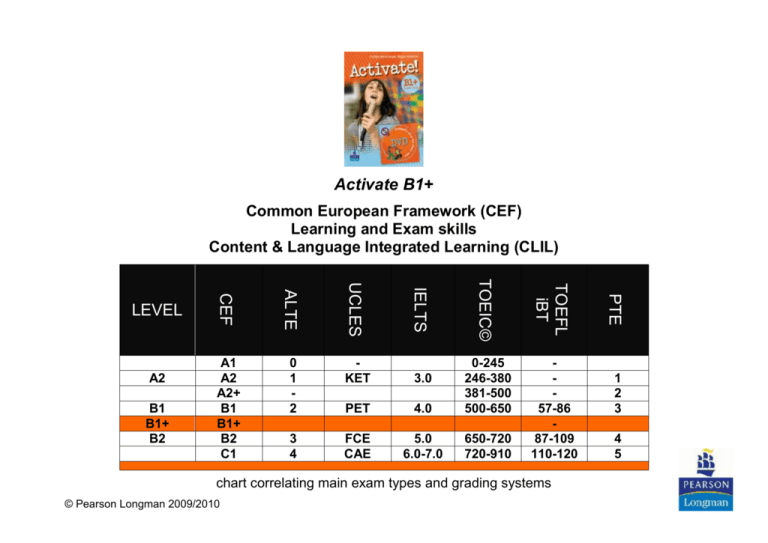
Activate B1+
Common European Framework (CEF)
Learning and Exam skills
Content & Language Integrated Learning (CLIL)
KET
3.0
PET
4.0
0-245
246-380
381-500
500-650
3
4
FCE
CAE
5.0
6.0-7.0
650-720
720-910
57-86
87-109
110-120
chart correlating main exam types and grading systems
© Pearson Longman 2009/2010
PTE
0
1
2
TOEFL
iBT
TOEIC©
IELTS
UCLES
B1
B1+
B2
A1
A2
A2+
B1
B1+
B2
C1
ALTE
A2
CEF
LEVEL
1
2
3
4
5
CEF
I can read a magazine article about style.
8/9
Vocabulary: Fashion and style
Present Simple Present Continuous review.
Articles / count and non-count nouns
I can give a short oral summary.
I can say how my clothes reflect my personality.
I can say what I would change about my style.
I can exchange information and express my
opinions.
I can make comparisons.
I can talk about past experiences and describe my
feelings.
I can understand simple conversations in different
contexts.
I can understand people expressing their opinions.
I can plan and prepare a magazine or website
article describing my favourite outfit.
I can make lists of ideas.
I can select the best ideas.
I can organise ideas in paragraphs.
10/11
14/15
I can understand a narrative report about a
museum visit.
I can make suggestions about leisure facilities.
I can describe and suggest locations.
CEF
ref
Pages
Unit 1
B1
B1
Read for gist and identify topics in
paragraphs.
Answer multiple choice comprehension
questions.
Match words / definitions
13
B1
B1
Summarise
Compare.
Exchange information
12
B1
Understand attitudes
16/17
B1
B1
Prepare website.
List ideas, select and organise into
paragraphs.
18/19
B1
B1
Search for and find information in a text.
Find words in a text which have opposite
meanings to given meanings.
Reading
Language
Speaking
Listening
Writing
Learning and Exam skills
CLIL
Art: Fashion,
style image
Unit 2
Reading
© Pearson Longman 2009/2010
Museums of
modern art and
sculpture, open
air museums.
Language
Speaking
Listening
Writing
REVISE
CEF
Vocabulary: sightseeing
Past Simple, Past Continuous review
Prepositions of place and movement.
Comparatives and superlatives.
I can give an oral report based on a text.
I can express my ideas about art.
I can say what I like or don’t like and give
reasons.
I can describe local sculptures or statues.
I can understand a person describing the results of
a survey.
I can plan and write a report suggesting local sites
for international visitors.
Revision of grammar and vocabulary.
Cloze narrative completion.
Matching sentence sections.
Completing a personal letter.
20/21
24/25
I can understand an article and diary.
30/31
Vocabulary: Education, personal qualities.
Present Perfect Simple vs. Past Simple.
Present Perfect Continuous
Adjectives and prepositions
Reflexive pronouns
32/33
36/37
CEF
ref
Pages
Unit 2
Contd
Learning and Exam skills
23
B1
B1
B1
Describe objects.
Express preferences.
22
B1
Listening to numerical information.
26/27
B1
B1
Report writing.
CLIL
Local public art.
Local history and
culture.
Cloze
Matching
Unit 3
Reading
Language
© Pearson Longman 2009/2010
B1
B1
Match sentences to gaps in a text.
Read and understand the format of emails.
Music,
Geography
Culture:
comparing
education
systems.
Speaking
Listening
Writing
CEF
CEF
ref
Pages
Unit 3
Contd
Learning and Exam skills
I can give and oral summary.
I can express opinions about future prospects and
give reasons.
I can describe a person and their personal
qualities.
I can discuss the personal qualities of celebrities.
I can what school subjects each celebrity might
teach.
I can discuss the advantages and disadvantages of
different styles of education.
I can understand short conversations on different
topics.
I can complete a form with information about
myself.
I can complete gaps in a personal letter.
I can write a reply to an email from notes.
35
B1
B1
B1
Summary
Opinions and reasons.
Descriptions of people.
For & against ideas.
34
B1
B2
B1
Identify to topic of a conversation.
I can understand a magazine article in which four
individuals describe their current activities and
plans.
Future forms: Present continuous, going to, Future
Simple, Future continuous, Future perfect simple.
Intensifying adjectives.
Future time clauses.
I can summarise another person’s feelings.
I can give reasons for activity choices.
I can say what I would like to do and give reasons.
I can list what I would take with me for a
hypothetical event.
I can describe my regular routines.
40/41
B1
B1
Search for specific information in a
collection of texts.
B1
B1
B1
Hypothetical decisions.
38/39
Completing g forms.
Write replies to emails.
CLIL
Communication
skills.
Unit 4
Reading
Language
Speaking
© Pearson Longman 2009/2010
42/43
46/47
45
Extreme sports
Health and
fitness
Listening
Writing
REVISE
Unit 5
Reading
Language
Speaking
Listening
Writing
CEF
CEF
ref
Pages
Unit 4
Contd
Learning and Exam skills
CLIL
I can understand recorded descriptions of
experiences.
I can complete a closed holiday report.
I can plan and write a formal letter, in response to
an advertisement, asking for further information.
Grammar, vocabulary, cloze emails.
44
B1
48/49
B1
I can read a magazine article describing reactions
to a TV series.
52/53
B1
Match captions to photographs.
Answer multiple choice questions.
Understand words from context.
Science,
Literature
adverb>adjective formation
Past Perfect Simple
Past Perfect Continuous
used to for past states
used to and would for repeated actions in the past
I can select and summarise parts of a text.
I can say why I would or would not do something.
I can discuss the advantages and disadvantages of
fame.
I can ask questions politely.
I can express preferences about films.
I can describe characters and special effects in
films.
I can understand a radio interview describing past
events.
I can listen for the main stress in statements.
I can write a short fictional story using time
markers to sequence events and incorporating
direct speech to make the story more vivid.
54/55
58/59
57
B1
B2
Selective summary.
For & against.
Polite questions.
Express preferences
Cinema and
literature
56
B1
Predict likely questions.
Exam skills
60/61
B1
B1
Using time markers in narratives.
Language
development
© Pearson Longman 2009/2010
Combine information from different
sources.
Report writing
Letter writing.
Reading
Language
Speaking
Listening
Writing
CEF
I can understand a magazine article in which four
individuals describe their experiences at a fitness
club.
Vocabulary: parts of the body, phrasal verbs,
compound nouns
Modals:ability in present and past
Modals: obligations and necessity
Gerunds as names for sports
Sports vocabulary and collocations
Modals: should/should’n’t have done
needn’t have done
can’t have done
could/ may/might have done
62/63
I can give and oral summary of events using time
markers.
I can describe unnecessary or regrettable
activities.
I can understand a radio interview about a training
camp.
I can understand a radio discussion about teenage
fitness.
I can plan and write an essay presenting
arguments in favour of or against a proposition.
I can understand a magazine story about anger
management.
CEF
ref
Pages
Unit 6
Learning and Exam skills
B1
B1
B2
True /false Qs. Comprehension Qs, Match
meanings to words.
67
B2
B2
Summarise using time markers.
Agree and disagree politely.
66
B2
B2
70/71
B2
B2
Write in an appropriate register.
75
B2
B1
Insert missing sentences in the correct gaps.
Match words / definitions
CLIL
Life science:
Health, fitness
and diet
64/65
68/69
Unit 7
Reading
© Pearson Longman 2009/2010
Health: anger
management
Language
Speaking
Listening
Writing
CEF
Vocabulary: emotions
Indirect objects
Imperatives
Word formation: nouns from verbs and adjectives
suggest for advice
would rather / would prefer for preference
I can summarise a text.
I can describe events which I regret.
I can give advice.
I can make suggestions.
I can understand multiple conversations.
74/75
CEF
ref
Pages
Unit 7
Contd
Learning and Exam skills
CLIL
Sports safety
76/77
80/81
B1
B1
Summarise
Give advice
Make suggestions
79
B2
I can complete a cloze diary extract.
I can plan a write a letter giving advice,
supporting my advice with reasons.
78
82/83
B2
Identify the topic and context and answer a
question.
Cloze
Plan advice letter
I can understand a brochure and encyclopaedia
entries about endangered species and
environmental experiences.
Vocabulary: different environments, collocations
Conditionals: zero, first, second, third
if/ unless
Phrasal verbs with be
Have / get something done
I can describe the landscape and wildlife in my
own country.
I can express my opinion about using animals as
symbols.
84/85
B1
Use headings to locate information quickly.
B2
B2
Describe landscape.
Unit 8
Reading
Language
Speaking
© Pearson Longman 2009/2010
86/87
86/87
90/91
Environmental
science
Listening
Writing
REVISE
Unit 9
Reading
Language
Speaking
Listening
Writing
CEF
I can understand extracts from: a radio
programme, a presentation, a lesson, an interview,
a statement of preference, a comment on changes.
I can plan, prepare and write a report using a
formal or neutral style and impersonal statements.
Grammar and vocabulary
© Pearson Longman 2009/2010
Learning and Exam skills
88/89
B2
Combine information from different
sources.
92/93
B2
Report writing
B2
Combine information from different
sources.
Use grammatical and lexical links to read
faster.
CLIL
94/95
I can understand four film reviews.
I can find common features.
I can read a book review.
Frequent passive forms.
Vocabulary: crime and criminals
Word families
Modals: possibility: may/ might/ could
certainty: must / have to
impossibility: can’t/ must have done/ can’t have/
couldn’t have
I can talk about films I have seen.
I can summarise the plot of a film or TV series.
I can say why I watch or don’t watch detective
series.
I can tell jokes and anecdotes.
I can participate in a discussion of ideas
concerning school rules.
I can understand five different speakers describing
their experiences of crime or bad behaviour.
I can plan and write a narrative story using correct
paragraphing, topic sentences, adjectives and
adverbs.
CEF
ref
Pages
Unit 8
Contd
96/97
Cinema,
reviewing skills
Body language
98/99
102/103
B2
B2
B2
Report experiences.
Summarise plots.
Give reasons for preferences
Participate in discussion.
Tell jokes
101
B2
100
B2
Combine information from different
sources.
Narrative writing
Citizenship
Reading
Language
Speaking
Listening
Writing
REVISE
CEF
I can understand a magazine report on work
experience in a TV station.
106/107
Vocabulary: news and people in the news media
Gerunds and infinitives
Syllable stress
Phrasal verbs
I can summarise a process.
I can comment on the qualities required by a
newsreader.
I can talk about my interest in local and
international news.
I can express contrasting opinions.
I can discuss topics for articles in the school
newspaper.
I can use questions to predict what will be said in
a news item.
I can understand someone describing different TV
news stories.
I can write a magazine article describing the skills
required for a young TV reporter.
106/107
Grammar and vocabulary.
114/115
© Pearson Longman 2009/2010
CEF
ref
Pages
Unit 10
Learning and Exam skills
B1
B1
Identify the topic of different paragraphs.
Answer multiple choice questions.
Understand words from context.
Read and understand newspaper headlines.
108/109
112/113
B1
B2
B1
Summarise process.
Substitute known words for unknown words
Combine information from different
sources.
Describe news interests
111
B1
B1
Prediction.
Combine information from different
sources.
110
B2
B2
Write an interesting introduction and
conclusion.
Organise ideas into paragraphs in the body
of the article.
CLIL
Careers: work
experience
Careers
Language
Speaking
Listening
Writing
I can understand a magazine article about
converting a warehouse into an apartment.
I can read letters in response to job
advertisements.
Vocabulary: employment and careers
Reporting statements and questions.
Indirect questions for polite enquiries.
I can summarise a text.
I can speculate what happens later.
I can discuss the advantages or disadvantages of
different careers.
When offered options, I can explain why I haven’t
chosen each rejected option.
I can discuss the advantages of summer jobs.
I can understand two speakers speaking about
work experience.
I can understand a radio talk in five parts about
work experience in the USA.
I can plan, organise and write a formal letter in
response to a job advertisement.
Unit 12
Reading
CEF
I can read and understand an internet article about
an internet project.
I can read a text about an author.
© Pearson Longman 2009/2010
CEF
ref
Pages
119/124
B2
Learning and Exam skills
Place missing sentences in gaps in the text
using synonyms to help.
118/119
120/121
124/125
B2
B2
For & against.
Explaining choices.
123
B2
Combine information from different
sources.
124/125
B1
Formal letter, response to advertisement.
126/127
CLIL
Careers
Home
improvements
Careers
CEF
ref
Reading
CEF
Pages
Unit 11
B2
Learning and Exam skills
Use headings to find information in the
article.
Find words to match meanings.
CLIL
Computers and
information
technology
Language
Speaking
CEF
Vocabulary: computer technology
Collocations
Defining and non-defining relative clause
Using adjectives in correct order
Modals: regrets about the present wish/if only
wishes for the future: wish / if only + would
regrets about the past: wish / if only + past perfect
I can summarise an article.
I can express my opinions about an idea and give
reasons.
I can name my favourite website and explain why
I like it.
I can engage in conversations, commenting on and
expanding the other speaker’s ideas and
presenting my own ideas politely.
I can describe my wishes.
I can listen to and follow a formal presentation.
128/129
I can complete a set of internet safety rules.
I can plan, organise and write an opinion essay on
a given topic.
I can present the arguments in favour or against in
a balanced way. I can summarise the argument
and present my own opinion.
Grammar and vocabulary
CEF
ref
Pages
Unit 12
Contd
130/131
134/135
B2
B2
Summarise
Express opinions and give reasons.
Express preference and give reasons.
Participate in conversation.
133
B2
136/137
B2
Follow a presentation.
Listen for gist, specific information and
attitudes.
Opinion essay
Listening
Writing
REVISE
© Pearson Longman 2009/2010
Learning and Exam skills
138/139
CLIL
Learning skills
Cross-curricular
academic writing
skills
General description
Activate B1+ is a course in general English for teenagers. It consolidates and extends the grammar and vocabulary required for B1 level. In addition, the
exercise types train students in examination skills since they echo task items found in the PET examination.
The reading skills development work includes a wide range of text types, including magazine articles, stories, reports and letters. Listening includes interviews,
reports, discussions, radio programmes as well as 12 authentic video clips on the DVD. Students are trained in doing multiple choice comprehension questions,
identifying topics, completing cloze tasks, and understanding words from context. Listening tasks include basic comprehension, identifying speakers and
contexts and noticing attitudes.
In speaking, students are trained to ask for and give information, ask for and express opinions giving reasons, discuss topics, undertake surveys, tell stories,
describe pictures and objects, maintain extended conversations and produce oral summaries. Students are also trained to write formal and informal letters,
reports, stories, reviews and letters of complaint.
CLIL and cross-curricular work
The topic material in the book and on the DVD provides many links across the learning curriculum. There are links to citizenship, arts, science, geography,
computer science, media studies, social studies. Topics also approach important behaviour related topics which are important for teenage learners such as
health, fitness, anger management, a good diet, and respect for rules.
This topic work will benefit from the students’ background knowledge in these areas as well as extending the students’ knowledge and understanding. The
training in both language and academic learning skills in Activate B1+ will be transferable across the curriculum, so, for example, the training in planning written
tasks will generate benefits in many different curriculum areas.
© Pearson Longman 2009/2010

